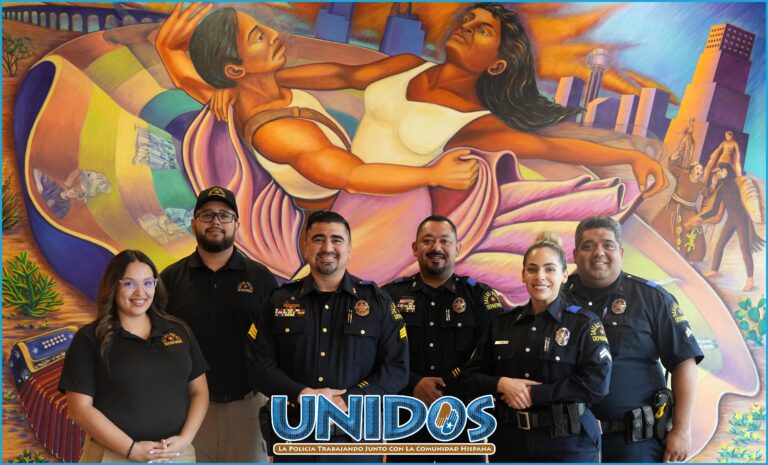Dallas Police Engage Latino Community to Strengthen Trust and Safety
In Dallas, law enforcement leaders are actively reaching out to the city’s Latino residents with a sincere message: “Do not fear us.” Recent months have seen growing unease and skepticism regarding police interactions within this community. To address these challenges, Dallas police are prioritizing transparency, open communication, and cultural understanding to rebuild trust and promote cooperative public safety efforts. This renewed focus is vital to ensuring that all Dallas residents feel both secure and valued.
Fostering Positive Connections through Community Involvement
Recognizing the historical strains and misunderstandings that have affected relations with the Latino community, Dallas police are implementing comprehensive strategies to nurture respect and partnership. These efforts include active participation in cultural events, organizing bilingual town hall meetings, and increasing recruitment of Latino officers to better mirror the city’s demographic diversity. By transforming apprehension into collaboration, the department aims to create an environment where residents feel protected rather than marginalized.
Current key programs include:
- Safety workshops offered in both Spanish and English to ensure accessibility
- Collaborations with Latino advocacy groups to elevate community concerns
- Youth engagement initiatives designed to empower and educate younger generations
| Program | Focus | Anticipated Benefit |
|---|---|---|
| Bilingual Town Halls | Community Engagement | Greater Transparency |
| Latino Officer Recruitment | Diversity & Inclusion | Improved Representation |
| Youth Safety Education | Prevention & Awareness | Stronger Community Bonds |
Confronting Misunderstandings and Alleviating Fears
Dallas police acknowledge that much of the fear within the Latino community arises from misconceptions and past negative experiences. To counter this, the department has launched culturally sensitive outreach programs aimed at clarifying concerns related to language barriers, immigration anxieties, and racial profiling. By fostering honest conversations and providing resources tailored to community needs, law enforcement seeks to replace suspicion with understanding.
Some of the department’s targeted actions include:
- Bilingual community liaisons who facilitate communication and cultural awareness
- Legal rights workshops that educate residents regardless of immigration status
- Implicit bias training for officers to minimize discriminatory behavior
- Regular open forums where residents can voice concerns and receive updates
These initiatives are designed not only to dispel myths but also to cultivate a foundation of mutual respect and safety.
| Community Concern | Police Response |
|---|---|
| Apprehension about deportation when reporting crimes | Assurance of assistance without immigration status inquiries |
| Distrust stemming from past racial profiling incidents | Expanded implicit bias education for officers |
| Communication challenges due to language differences | Deployment of bilingual officers and interpreters |
Promoting Transparency and Accountability in Policing
To rebuild confidence and ensure fairness, Dallas police have introduced several transparency-focused reforms. These include equipping all patrol officers with body cameras, proposing the creation of an independent civilian oversight board, and holding frequent community meetings tailored to Latino residents’ concerns. Such measures aim to document police interactions thoroughly and provide mechanisms for accountability, thereby reducing misunderstandings and fostering equitable treatment.
Core elements of the accountability framework:
- Mandatory training in de-escalation techniques and cultural competence for all officers
- Use of real-time data analytics to track response times and complaint trends
- Publicly accessible reporting platforms for transparency
- Partnerships with Latino organizations to co-create trust-building initiatives
| Reform | Current Status | Projected Outcome |
|---|---|---|
| Body-Worn Cameras | Fully Implemented | Improved Evidence and Transparency |
| Civilian Oversight Board | Awaiting Approval | Enhanced Accountability |
| Community Engagement Forums | Ongoing | Increased Dialogue and Trust |
| Officer Cultural Training | Expanded | Greater Cultural Awareness |
Collaborative Approaches to Strengthen Police-Community Relations
Establishing lasting trust between Dallas police and Latino residents demands intentional, sustained efforts. Hosting listening sessions and community forums where voices are genuinely heard is a foundational step. These safe spaces help dispel fears and foster mutual understanding. Additionally, integrating bilingual officers and cultural liaisons bridges communication gaps, enhancing clarity and rapport.
Further, joint problem-solving initiatives such as neighborhood watch groups and youth mentorship programs, co-developed by police and community members, empower residents to take an active role in public safety. These collaborations not only build solidarity but also contribute to crime reduction and community resilience. The table below highlights key partnership areas and their mutual benefits:
| Collaboration Focus | Police Contribution | Community Involvement | Expected Result |
|---|---|---|---|
| Community Forums | Facilitate open dialogue | Express concerns and feedback | Builds mutual trust |
| Bilingual Services | Provide language support | Engage effectively | Enhances communication |
| Youth Engagement | Develop educational programs | Participate actively | Reduces juvenile delinquency |
| Neighborhood Watch | Offer guidance and resources | Report suspicious activities | Improves community safety |
Looking Ahead: Building a Safer, United Dallas
As dialogues around policing and community relations continue to evolve, Dallas police remain committed to bridging divides with the Latino community. Their appeal to overcome fear and embrace open communication reflects a broader vision of safer neighborhoods founded on respect and cooperation. The success of these initiatives in the coming months will be pivotal in shaping a future where law enforcement and residents work hand-in-hand toward shared security and dignity.







